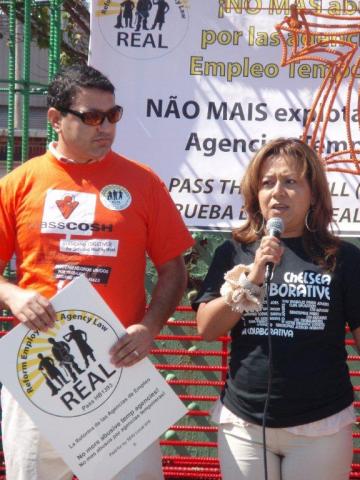
Temp Workers Rally in South Boston for REAL Reform Bill
BOSTON/South Boston - Over 80 temp workers and their community and labor allies rallied in South Boston on Thursday to draw attention to the exploitation of Massachusetts’ growing low-wage temporary workforce, just ahead of the Labor Day holiday.
The organizers are members of a diverse coalition of labor and community groups pressing for the adoption of a proposed state law that proponents say will force unregulated temp agencies to observe basic labor standards. According to the coalition, 88 state legislators support the new law, including Dorchester State Rep Marty Walsh, who spoke at the rally.
Union leaders and members turned out to support the temp workers, including members of SEIU Local 615 and a broad swath of unions from the construction trades. “We’re here to make sure these workers get basic rights and get treated with dignity,” said Frank Callahan, President of Mass Building Trades.
Rallying outside the Iron Workers Local 7 union hall on Old Colony Avenue, the temp workers - typically drawn from immigrant communities in places like East Boston, Chelsea, Springfield, and New Bedford - stepped forward to protest labor violations by temp agencies, which provide cheap labor to a growing number of Massachusetts companies.
Chelsea worker Evelyn Sanchez described how temp agencies deploy immigrant workers to dangerous worksites in fish processing, construction, and food preparation plants, without protective equipment or training. She said the agencies “care more about money than the dignity or respect of workers.” Other workers said the agencies routinely fail to provide them with the most basic information about the jobs, such as wages, hours, or even the identities of the companies using their labor.
“The workers don’t even know where they are going to work,” said Yessenia Alfaro, of the Chelsea Collaborative. “They just know to go where the van is.”
Under current law, temp agencies do not have to provide employees with written job assignments. Nor do they have to register their businesses with the state, allowing the proliferation of temp agencies that exploit the unique vulnerabilities of immigrant workers, especially undocumented ones. The proposed Reform Employment Agency Law (REAL) bill, or House Bill 1393, would require both practices.
After the rally a delegation headed for the South Boston office of Diamond Staffing, Inc., a Massachusetts temp agency that employs many of the Chelsea workers. The company operates 13 offices in the state.
The Massachusetts Coalition for Occupational Safety and Health, or MassCOSH, is trying to get temp agencies to voluntarily adopt the bill’s policies in advance of hoped-for passage this fall. “This campaign is about more than just one bill,” says the group’s executive director Marcy Gelb. “It really is building a movement to end temp worker abuse and create a baseline of decent conditions for blue collar workers.” She said that Diamond Staffing did not agree to meet with REAL Coalition members, but that office staff threatened to call the police to oust the delegation.
Outside the Dorchester Avenue office, organizers with MassCOSH’s Worker Center described work with Diamond Staffing. Mirna Montano said that the agency vans typically collect workers at 6:30 in the morning to bring them to jobs in bakeries and fish processing plants, where they work without a break until three, four, or five in the afternoon.
Jonny Arevelo said the agency prefers to hire young, female workers for some jobs, dropping them off at worksites without so much as a guarantee of work. “If they’re not chosen to work,” he said, “they can wait as long as six hours for the van to come back to get them.” Adding to the indignity, the company routinely deducted a $6 daily transportation fee from the workers’ $8.50 per hour wage. He added, “they’re afraid to ask questions because they need the work.”
Diamond Staffing, Inc. did not respond to a request for comment.
A UMass Amherst report issued last spring documented many of the abuses cited at the rally, finding that low-wage temp workers work long hours in dangerous jobs for poverty wages, outside the reach of government oversight. Injuries, wage theft, and other violations are rampant in the industry.
The report’s authors concluded that many companies use temporary labor to evade state health and safety laws. Because the companies do not employ the workers directly, they don’t have to provide worker’s compensation insurance, and therefore have no incentive to ensure safe working environments.
While legitimate temp agencies do carry this insurance, current law does not require them to disclose this information to their workers. Without a paper trail, the injured worker has nowhere to turn. The UMass report also documents widespread retaliation against workers for reporting health and safety violations.
Massachusetts companies increasingly rely on temp agencies to fill positions formerly held by permanent employees. The practice, which the report calls “permatemping,” has become endemic in the service and industrial sectors of labor market.
Sanchez said that almost half the employees at Rudy’s Bakery in Chelsea - a Diamond Staffing client - were temporary employees.
Find the full report, “The Challenge of Temporary Work in Twentieth Century Labor Markets: Flexibility with Fairness for the Low-Wage Temporary Workforce,” at http://www.masscosh.org/.

